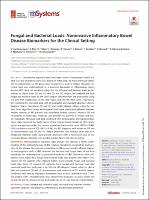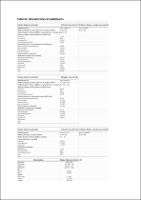| dc.contributor | Vall d'Hebron Barcelona Hospital Campus |
| dc.contributor.author | Philippe Sarrabayrouse, Guillaume |
| dc.contributor.author | Elias Vidal, Andrea |
| dc.contributor.author | Yañez Araya, Francisca |
| dc.contributor.author | Mayorga Ayala, Luis Fernando |
| dc.contributor.author | Bartoli, Chiara |
| dc.contributor.author | Casellas Jordá, Francesc |
| dc.contributor.author | Borruel Sainz, Natalia |
| dc.contributor.author | Herrera de Guise, Claudia Maria |
| dc.contributor.author | Manichanh, Chaysavanh |
| dc.contributor.author | Varela Castro, Encarna |
| dc.date.accessioned | 2022-03-30T09:04:44Z |
| dc.date.available | 2022-03-30T09:04:44Z |
| dc.date.issued | 2021-03 |
| dc.identifier.citation | Sarrabayrouse G, Elias A, Yáñez F, Mayorga L, Varela E, Bartoli C, et al. Fungal and Bacterial Loads: Noninvasive Inflammatory Bowel Disease Biomarkers for the Clinical Setting. mSystems. 2021 Mar;6(2):e01277-20. |
| dc.identifier.issn | 2379-5077 |
| dc.identifier.uri | https://hdl.handle.net/11351/7274 |
| dc.description | Inflammatory bowel disease; Microbial load; Prediction |
| dc.description.abstract | Microbiome sequence data have been used to characterize Crohn's disease (CD) and ulcerative colitis (UC). Based on these data, we have previously identified microbiomarkers at the genus level to predict CD and CD relapse. However, microbial load was underexplored as a potential biomarker in inflammatory bowel disease (IBD). Here, we sought to study the use of fungal and bacterial loads as biomarkers to detect both CD and UC and CD and UC relapse. We analyzed the fecal fungal and bacterial loads of 294 stool samples obtained from 206 participants using real-time PCR amplification of the ITS2 region and the 16S rRNA gene, respectively. We combined the microbial data with demographic and standard laboratory data to diagnose ileal or ileocolonic CD and UC and predict disease relapse using the random forest algorithm. Fungal and bacterial loads were significantly different between healthy relatives of IBD patients and nonrelated healthy controls, between CD and UC patients in endoscopic remission, and between UC patients in relapse and non-UC individuals. Microbial load data combined with demographic and standard laboratory data improved the performance of the random forest models by 18%, reaching an average area under the receiver operating characteristic curve (AUC) of 0.842 (95% confidence interval [CI], 0.65 to 0.98), for IBD diagnosis and enhanced CD and UC discrimination and CD and UC relapse prediction. Our findings show that fecal fungal and bacterial loads could provide physicians with a noninvasive tool to discriminate disease subtypes or to predict disease flare in the clinical setting.
IMPORTANCE Next-generation sequence data analysis has allowed a better understanding of the pathophysiology of IBD, relating microbiome composition and functions to the disease. Microbiome composition profiling may provide efficient diagnosis and prognosis tools in IBD. However, the bacterial and fungal loads of the fecal microbiota are underexplored as potential biomarkers of IBD. Ulcerative colitis (UC) patients have higher fecal fungal and bacterial loads than patients with ileal or ileocolonic CD. CD patients who relapsed harbor more-unstable fungal and bacterial loads than those of relapsed UC patients. Fecal fungal and bacterial load data improved prediction performance by 18% for IBD diagnosis based solely on clinical data and enhanced CD and UC discrimination and prediction of CD and UC relapse. Combined with existing laboratory biomarkers such as fecal calprotectin and C-reactive protein (CRP), microbial loads may improve the diagnostic accuracy of IBD and of ileal CD and UC disease activity and prediction of UC and ileal CD clinical relapse. |
| dc.language.iso | eng |
| dc.publisher | American Society for Microbiology |
| dc.relation.ispartofseries | mSystems;6(2) |
| dc.rights | Attribution 4.0 International |
| dc.rights.uri | http://creativecommons.org/licenses/by/4.0/ |
| dc.source | Scientia |
| dc.subject | Intestins - Inflamació |
| dc.subject | Intestins - Microbiologia |
| dc.subject | Intestins - Malalties - Prognosi |
| dc.subject.mesh | Crohn Disease |
| dc.subject.mesh | /diagnosis |
| dc.subject.mesh | Prognosis |
| dc.subject.mesh | Bacterial Load |
| dc.title | Fungal and Bacterial Loads: Noninvasive Inflammatory Bowel Disease Biomarkers for the Clinical Setting |
| dc.type | info:eu-repo/semantics/article |
| dc.identifier.doi | 10.1128/mSystems.01277-20 |
| dc.subject.decs | enfermedad de Crohn |
| dc.subject.decs | /diagnóstico |
| dc.subject.decs | pronóstico |
| dc.subject.decs | carga bacteriana |
| dc.relation.publishversion | https://doi.org/10.1128/mSystems.01277-20 |
| dc.type.version | info:eu-repo/semantics/publishedVersion |
| dc.audience | Professionals |
| dc.contributor.organismes | Institut Català de la Salut |
| dc.contributor.authoraffiliation | [Sarrabayrouse G, Elias A, Yáñez F, Mayorga L, Bartoli C, Herrera de Guise C] Servei de Gastroenterologia, Vall d’Hebron Institut de Recerca (VHIR), Barcelona, Spain. [Varela E, Casellas F, Borruel N, Manichanh C] Servei de Gastroenterologia, Vall d’Hebron Institut de Recerca (VHIR), Barcelona, Spain. CIBERehd, Instituto de Salud Carlos III, Madrid, Spain |
| dc.identifier.pmid | 33758031 |
| dc.identifier.wos | 000665831100009 |
| dc.relation.projectid | info:eu-repo/grantAgreement/ES/PE2013-2016/PI17%2F00614 |
| dc.relation.projectid | info:eu-repo/grantAgreement/ES/PERIS2016-2020/SLT002/16 |
| dc.rights.accessrights | info:eu-repo/semantics/openAccess |


